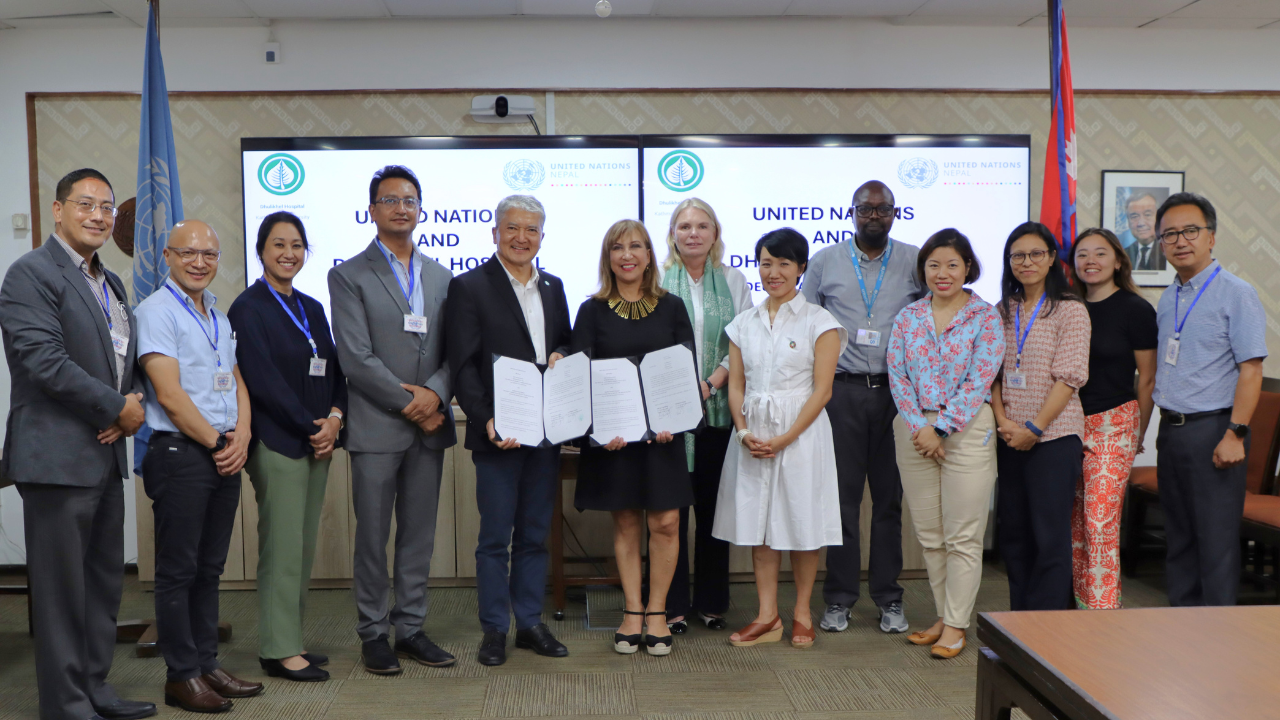
On July 31st, a historic partnership was announced in Kathmandu, Nepal, between the United Nations in Nepal and Dhulikhel Hospital. This strategic partnership formalized through a Joint Declaration of Intent, seeks to revolutionise healthcare delivery across Nepal and drive progress towards achieving the Sustainable Development Goals (SDGs) by 2030.
This collaboration represents a critical step towards enhancing health services across the country, particularly for the most vulnerable populations.
The Partnership Overview:
The partnership was officially formalized in a signing ceremony where UN Resident Coordinator Hanaa Singer Hamdy and Professor Dr. Ram Kantha Makaju Shrestha of Dhulikhel Hospital emphasized the importance of collaborative efforts to tackle health challenges. This alliance is not just a response to immediate health needs but a strategic alignment towards long-term health improvements and resilience, especially in the post-COVID-19 context.
Who’s Involved and What’s the Goal?
The collaboration includes the UN Resident Coordinator’s Office and four key UN agencies: UNFPA, UNICEF, IOM, and WHO. These agencies are partnering with Dhulikhel Hospital, a renowned academic institution known for its innovative approaches to healthcare.
The partnership aims to transform healthcare in Nepal by focusing on key areas like post-COVID-19 recovery and resilience, strengthening primary healthcare delivery, and addressing pressing public health challenges such as infectious diseases, maternal and child health, and non-communicable diseases.
Nepal faces significant healthcare challenges, including limited access to quality care, particularly in rural areas. This collaboration seeks to leverage the expertise and resources of both the UN and Dhulikhel Hospital to address these challenges and improve health outcomes for all Nepalis.
The Power of Partnership: Leveraging Expertise and Resources
This collaboration is a powerful example of how partnerships between international organizations and local institutions can drive meaningful change. By combining the UN’s global health expertise and resources with Dhulikhel Hospital’s deep understanding of the local context and innovative approaches, the partnership aims to:
- Enhance Post-COVID-19 Recovery and Resilience: Strengthen healthcare systems to better prepare for and respond to future health crises.
- Improve Primary Healthcare Delivery: Expand access to quality primary healthcare services, especially in underserved areas.
- Tackle Public Health Challenges: Address critical health issues like infectious diseases, maternal and child health, and non-communicable diseases through research, training, and community outreach.
Key Areas of Focus:
The UN-Dhulikhel Hospital partnership will concentrate its efforts on several critical areas:
- Research and Innovation: Collaborating on research projects to identify effective solutions to pressing health challenges in Nepal.
- Capacity Building: Strengthening the skills and knowledge of healthcare workers through training and education programs.
- Community Engagement: Developing and implementing community-based health interventions to reach vulnerable populations.
- Policy Advocacy: Working with the government to develop and implement evidence-based health policies.
Conclusion
The collaboration between the UN and Dhulikhel Hospital is a visionary step towards transforming Nepal’s healthcare landscape. It leverages the strengths of both local and global entities to foster a healthcare system that is not only responsive but also resilient and aligned with the global goals of sustainable development.
This partnership exemplifies how strategic alliances can significantly propel a nation towards achieving comprehensive healthcare goals and the SDGs.

![How To Check SIM Owner Name in NTC [Step-by-Step Guide]](https://localpatrika.com/wp-content/uploads/2024/08/How-To-Check-SIM-Owner-Name-in-NTC-100x75.webp)
![Nothing Phones Price in Nepal [Updated 2024]](https://localpatrika.com/wp-content/uploads/2024/08/Nothing-Phones-price-in-Nepal-100x75.webp)

